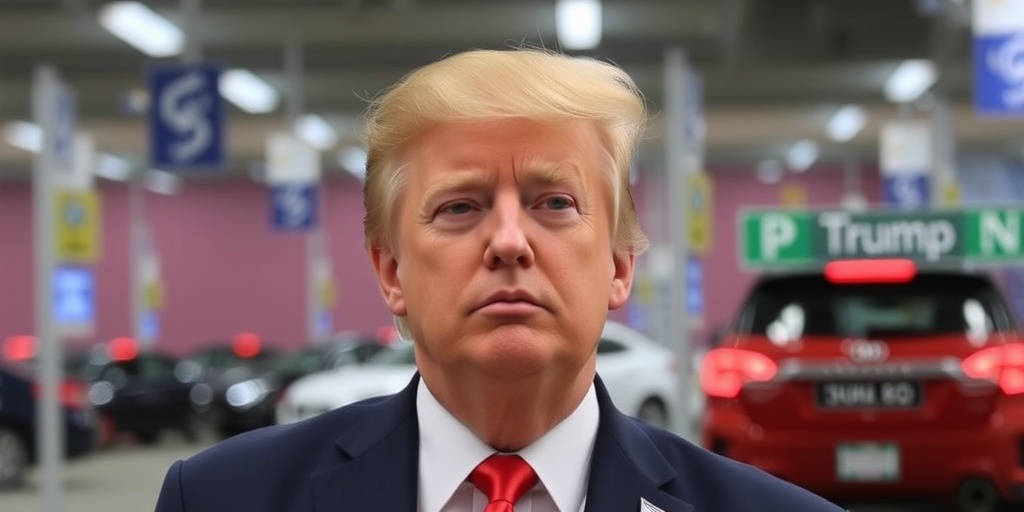Now Reading: Stocks Climb as Car Import Tariffs Are Postponed
-
01
Stocks Climb as Car Import Tariffs Are Postponed
Stocks Climb as Car Import Tariffs Are Postponed

Stocks Surge as Trump Delays Tariffs on Car Imports: Market Reactions and Implications
In a significant turn of events for the financial markets, stocks surged on Wednesday, buoyed by President Trump’s announcement of a one-month delay on tariffs imposed on car imports from Canada and Mexico. This decision, which comes amid rising tensions over trade policies, was well-received by investors eager for signs of easing trade restrictions that have the potential to impact corporate profits and economic stability.
The S&P 500 index experienced a notable rebound, climbing approximately 1.2 percent after facing two consecutive days of declines. Meanwhile, the technology-heavy Nasdaq Composite index posted an even more impressive gain, rising by about 1.4 percent following a downturn earlier in the week. These movements reflect a broader sense of relief among investors who were previously rattled by the immediate implementation of new tariffs on goods from Canada, Mexico, and China, which took effect on Tuesday. This shift in sentiment also highlights the underlying concerns regarding the overall impact of extensive tariffs on global trade and economic growth.
President Trump addressed the nation on Wednesday, confirming the temporary suspension of tariffs on cars imported from Canada and Mexico for a period of one month. He stated that while this pause would allow for a reevaluation of trade relations, the 25 percent tariff on a wide range of other imports would remain in effect. This mixed message has drawn both optimism and skepticism, as investors weigh the implications of his administration’s trade policy on various sectors.
Following the announcement, shares of major U.S. automobile manufacturers experienced a boost, reflecting immediate investor confidence in the sector. Ford Motor Company’s stock increased by 5.7 percent, General Motors rose by 7.4 percent, and Stellantis—a significant player in the auto industry—saw shares soar by around 9.1 percent. This uptick is particularly significant as many car manufacturers have deep ties to Canadian and Mexican suppliers and factories. The logistics of relocating production to the U.S. are not straightforward, and the temporary reprieve from tariffs is expected to provide much-needed relief to these companies during a tumultuous period.
Analysts suggest that the decision to delay tariffs on automotive imports indicates a strategic approach by the Trump administration, aimed at mitigating potential backlash from the automotive industry—which is a critical component of the U.S. economy. The automotive sector not only contributes to direct employment but also plays a pivotal role in various supply chains across North America. By easing tariffs, the administration may be trying to stabilize an essential economic segment while simultaneously addressing the broader trade tensions that have been a focus throughout Trump’s presidency.
The broader implications of these tariff adjustments extend beyond the automotive industry. Investor concerns regarding the potential for increased corporate expenses due to sweeping tariffs have been prevalent since they were announced. Many market participants fear that these tariffs could not only depress corporate profits but also lead to higher inflation rates as the costs trickle down to consumers. The possibility of retaliatory measures from affected countries also looms large, as trade partners assess the potential for escalating tensions.
As the economic landscape continues to evolve, the recent rally in stock prices may indicate a temporary respite from the market’s previous apprehensions. However, the uncertainty surrounding future trade policies remains a critical concern. Investors are likely to keep a close watch on subsequent announcements from the administration related to tariffs—especially in the automotive sector, where the impact is most immediate and tangible.
In conclusion, while Wednesday’s rally offers a glimmer of hope for market participants and companies directly tied to the automotive industry, the overall outlook remains cautious. The interplay of governmental trade policies, corporate earnings, and global market dynamics will continue to shape the financial landscape in the coming months. Investors will need to remain vigilant, analyzing both the short-term effects of these tariff adjustments and the long-term implications for the U.S. economy and its position in the global market. As companies adjust to this new phase of trade policy, the business community and investors alike will be looking for further clarity and stability in a rapidly changing economic environment.
Stay Informed With the Latest & Most Important News
Previous Post
Next Post
-
 01New technology breakthrough has everyone talking right now
01New technology breakthrough has everyone talking right now -
 02Unbelievable life hack everyone needs to try today
02Unbelievable life hack everyone needs to try today -
 03Fascinating discovery found buried deep beneath the ocean
03Fascinating discovery found buried deep beneath the ocean -
 04Man invents genius device that solves everyday problems
04Man invents genius device that solves everyday problems -
 05Shocking discovery that changes what we know forever
05Shocking discovery that changes what we know forever -
 06Internet goes wild over celebrity’s unexpected fashion choice
06Internet goes wild over celebrity’s unexpected fashion choice -
 07Rare animal sighting stuns scientists and wildlife lovers
07Rare animal sighting stuns scientists and wildlife lovers





















